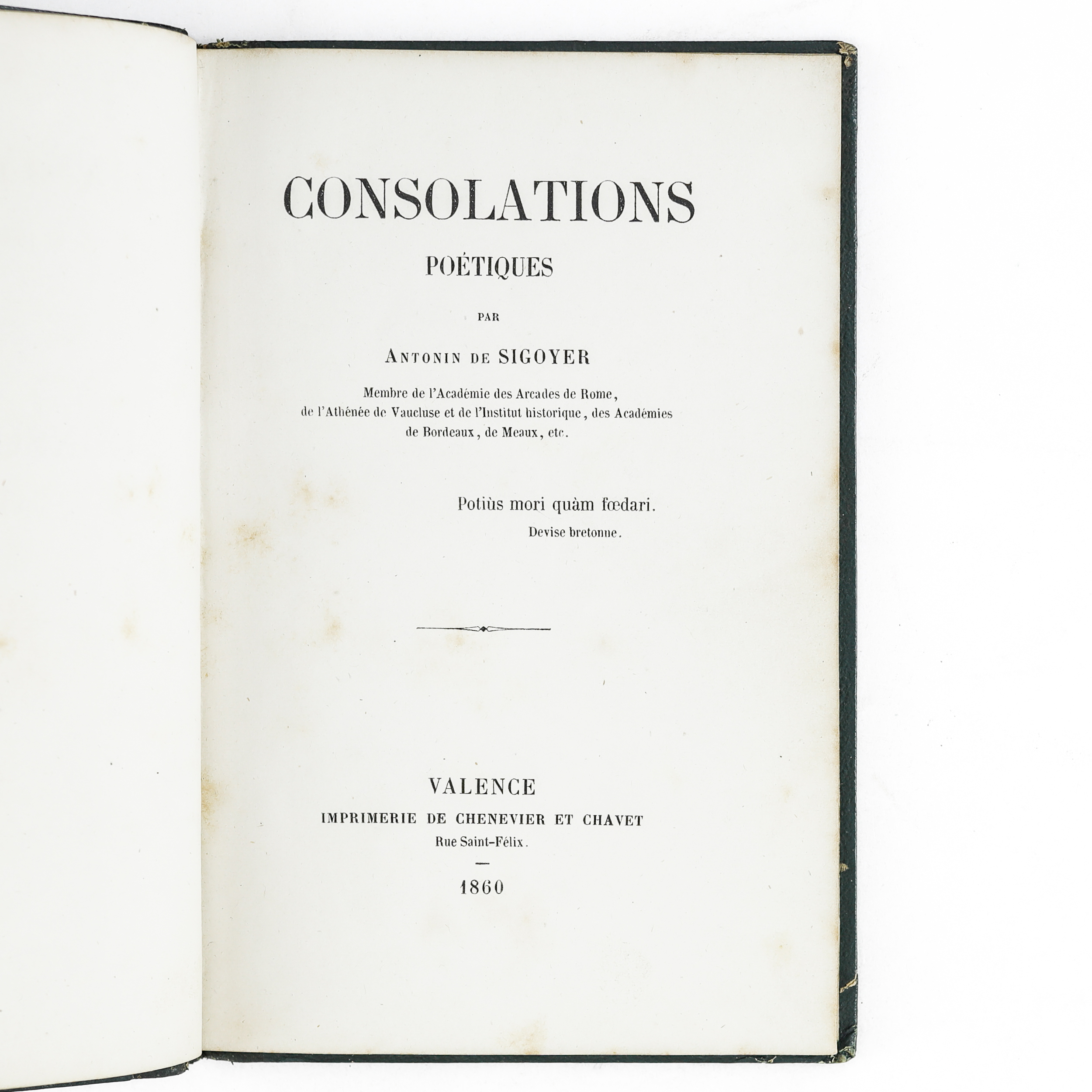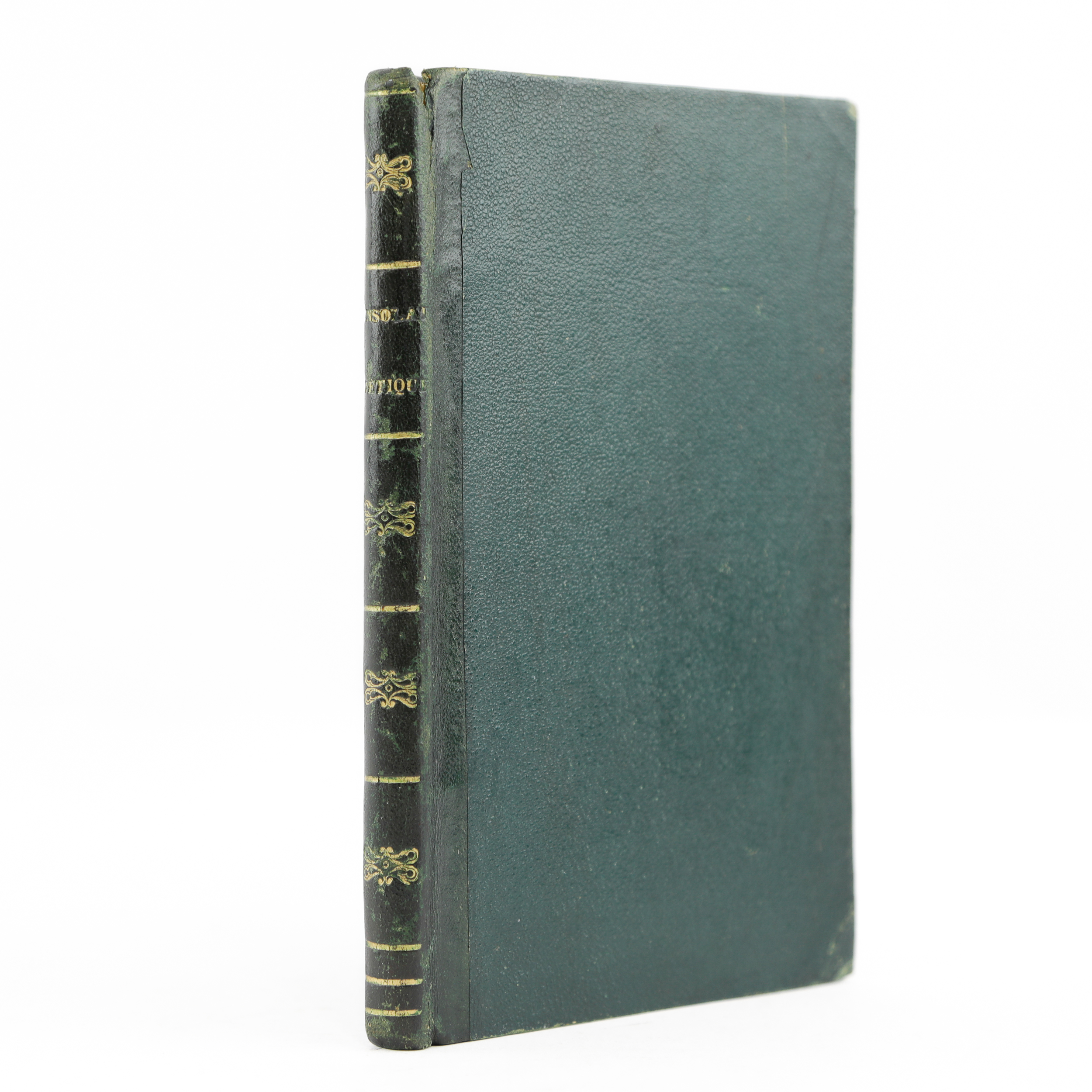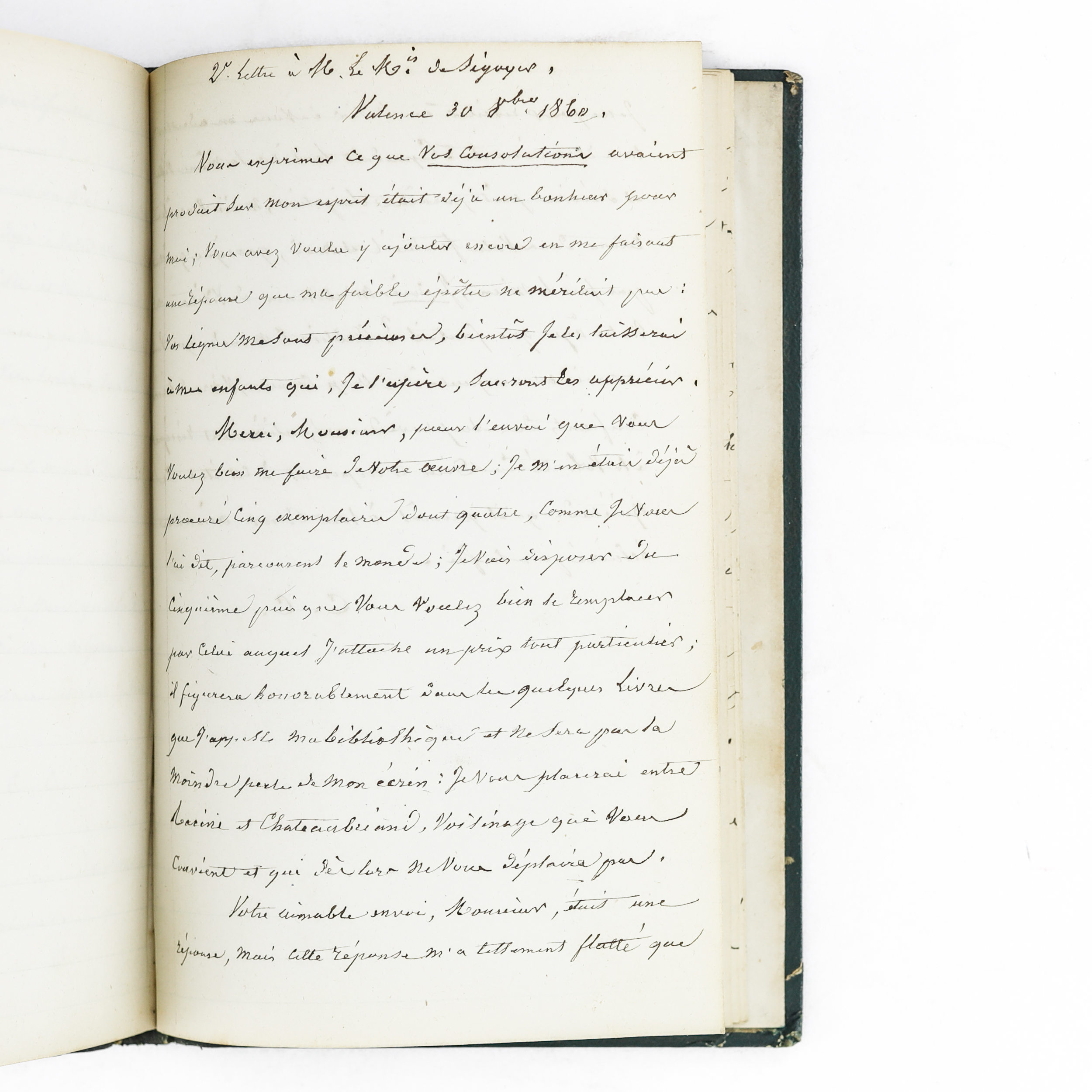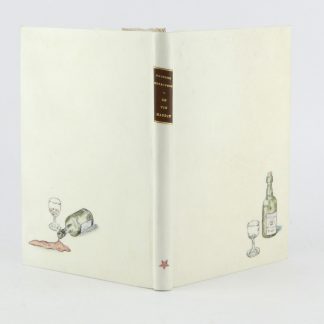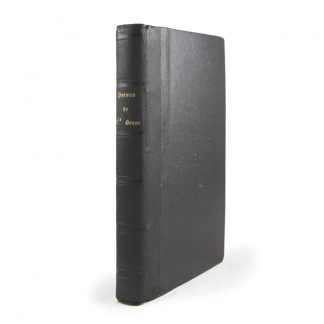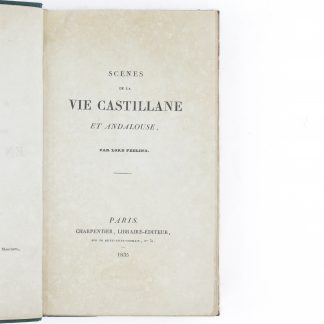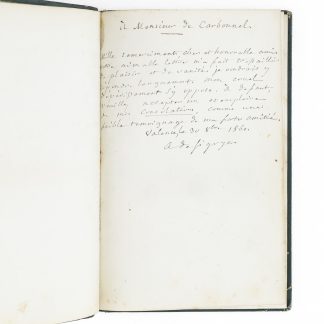Description
FIRST EDITION of the author's only collection of poems, published a few months before his death.
General Secretary of the Drôme Prefecture and assistant to the TDrôme bleakAntonin de Sigoyer anonymously published a pamphlet containing two poems, "The hermit of the catacombs"andThe guardian angel"He also published a number of his poems in the local press.
AUTOGRAPH SIGNED MAILING:
"to Monsieur de Carbonnel
A thousand thanks, dear and honourable friend, your kind letter made me tingle with pleasure and vanity, I would like to reply at length. My cruel decline prevents me from doing so. Failing that, please accept a copy of my Consolations, as a small token of my strong friendship.
Valence, 30 September 1860
A. de Sigoyer"
Autograph corrections in ink in the text.
COPY ENRICHED WITH CORRESPONDENCE
M. de Carbonnel has had an autograph copy bound with the work. the four letters of praise that he sent the author a copy of an article on the poetry of Valentin and the Consolations published in issue no. 262 of Courrier de la drôme et de l'ardèche (9 November 1860), and an autograph letter from the author.
"1st letter to M. le Mis de Sigoyer
Valence, 25 8bre 1860
I am older than you, and yet God has granted me a less painful old age than yours. Your pain, Sir, has often preoccupied my mind - if I dared, I would say my friendship - my thoughts have often flown to your armchair where I would have liked to be able to bring some relief to your suffering..., but alas, what could I do?... Only one day was I able to offer a helpless arm to an unfortunately even more helpless arm... since then I have had to turn to prayers.Your morale, Sir, did not suffer from these conditions; Family friend gave us some of your works on several occasions, and we were always amazed at the verve, the self-sacrificing elevation, the piety of a strong and resigned soul, superior to the sufferings of the body.
Sir, you have just given us a very small part of your portfolio. Why didn't you empty it completely? I have just got hold of this too small volume in which I have found something that I already owed to your kind memory: I am not very selfish and would like to share with my friends the pleasure that this book has given me, I am taking it to Artois, Flanders, the Upper Loire and the Côte d'Or.
It is not for everyone to say a lot in a few words, to write pretty little letters like the one at the head of your volume; but however diffuse this one may be, I hope you will not misunderstand the feeling that inspires it, and whose expression I beg you to accept.
C. C.
"2nd letter to M. le Mis de Sigoyer
Valence, 30 8bre 1860.
Express what your Consolations Your lines are precious to me, and soon I will be leaving them to my children, who I hope will appreciate them.
Thank you, Sir, for sending me your work; I had already bought five copies, four of which, as I told you, are all over the world; I am going to dispose of the fifth since you are willing to replace it with the one to which I attach a very special value: it will figure honourably among the few books I call my library and will not be the least pearl in my jewellery box: I will place you between Racine and Chateaubriand, a position which suits you and which, from then on, will not displease you.
Your kind letter, Sir, was a reply, but I was so flattered by it that I cannot resist expressing my thanks. However, living in the same town and writing to each other may seem strange, but you are confined to your armchair and I, although I sometimes leave mine, am still able to write to you. must refrain from visiting. At our age, what should we do? To forget the world that you and I have perhaps known too much, to live in seclusion, trusting in providence, entirely resigned to God's will and aspiring to that state of quietude that he promises to every loving heart enlightened by faith.
C. C."
"3rd letter to M. de Sigoyer
Valence 13 9bre 1860
I don't want to bore you, but I must tell you one more thing.
Like father, like son eis a proverb that is not without its exceptions. I don't quote this proverb in Latin, and with good reason...
As I told you, Sir, your Consolations travels; my second son, who has received a copy, tells me something about it: he tells me about the pleasure he has derived from reading it; he quotes me almost entirely from the first and last plays (Genius consoled by religion and Poetic desire) but I'm angry with him for not saying anything about the 20th page (Resignation). I don't think it's possible to sigh anything more melancholy; I'll give my son on the fingers for not stopping there.
In the few lines that I have received from your indulgent kindness, you speak to me, Sir, of a tendency towards vanity; self-love, it is true, borders on pride, and that is the first of serious sins; but a feeling of personal satisfaction is quite permissible after a good work; so don't be frightened by it, it is quite forgivable when one writes like you.
I'm sorry, Sir, for this new rag I'm sending you; I'd be happy, however, if it could distract you from your pain for a while; and then you have the option of throwing it in the fire when you arrive. from your bed to your chair (1)
Please accept, once again, the expression of my old feelings.
C. C.
(1) allusion to the 2nd stanza of the 3rd piece p. 20".
"Poetry in Valencia.
Does poetry flourish in Valencia? We have sometimes heard doubts expressed on this delicate point. Our soil is given the privilege of producing the generous wines that flatter the palates of the gourmets of Europe. They praise the beauty of our sky, which is already dazzling with the splendours of Provence, without having the same burning ardour. As for the superior product that Montaigne called the sparkling foam of the mindWe're reluctant to give them to us. And wrongly so. Valence holds its place among the intelligent cities of the Midi. One of its children, M. Emile Augier, has made a glorious mark in drama. His lively, clean verse, stamped with the stamp of Molière, can compete with that of today's best masters. Every week, the family friend offers its readers a piece of verse, and we do not believe that we are being blinded by patriotism in saying that some of these poems have a freshness and verve that we do not always find in the great lords of versification.
We will surprise no one by praising the charming stanzas of Abbé Angel Vigne; they flow effortlessly and without vulgarity, always pure and harmonious, from an inspiration that knows how to contain itself. On more than one occasion, Monsieur l'abbé Veyrenc has dropped from his pen pieces remarkable for the elevation and correctness of their style. We could also lift the veil that hides the humble Trinitarian sister from whom a fortunate hand occasionally steals a few pearls from her mysterious jewel box; one rarely reads them without emotion; one feels that the verse has sprung from the heart, like the dewdrop that shines in the morning in the corolla of certain flowers.
A small book entitled Poetic consolationswhich admirably confirms our assertion. The Marquis de Sigoyer, after having occupied high administrative functions, relaxes like the genius of spirit, by cultivating letters. Nailed to his chair a short while ago by a cruel illness, he experienced the muse who flees the happy. The light volume he has just published contains seventeen pieces, some of which are little masterpieces of grace and feeling.
M. de Sigoyer has long been familiar with all the secrets of versification. It is marvellous to see the ease with which he bends rhyme to his will; with him it is the submissive slave of the idea. The poetic phrase moves along without stilts, without affectation, without jerking; there is nothing clumsy or prosaic about it. In a word, M. de Sigoyer has the science of versification, and he has it all the better because he disguises it in the veil of ease and exquisite naturalness.
The word of Horace, which is the despair of the translator and yet which everyone understands so well, the molle atque facetum, perfectly characterises the talent of the poet from Valentin. In reading him, we are reminded of Plato's lovely expression, which calls poetry a winged thing.
Do not think that the content is inferior to the form. This little volume breathes noble sentiments that lift the soul. Faith enlightens it, charity warms it, smiles and tears are tempered by philosophy, and lofty thoughts are not uncommon, as witness the first piece of the collection: Genius consoled by religion. What an admirable thing, what an alarm to the immortal vitality of the soul! Here is a man already advanced in life, his body beaten down by suffering, crying out in vain for sleep, and whose every word is imbued with life, freshness and youth! Not only has the author consoled himself by pouring out his sorrows, but he will console more than one afflicted soul who will question his book like a friend. Isn't that the privilege of believers, who carry within them that which never grows old?
Et quasi cursores vitae lampada tradunt.
M. de Sigoyer is deeply Christian; he knows how to suffer and pray. He knows from which source the soul draws youth and hope. That is why his poetry is so radiant and penetrates the hearts of those who read it. So he took as his motto a word that suits his work perfectly: Potius mori quam fœdari. The gaze of innocence can, in fact, scan it without finding an idea or a word that offends it, what higher praise and what noble use of a great talent!
The best way to praise Consolations is to quote a few fragments from the piece entitled Mens Blanda, one of the gems of the collection.
(Here is a transcription of stanzas 1, 2, 3 and 4 on page 36).
When you read verses like these, you have the right to say that Valencia has a real poet.
Méry-Miller
Leaflet from the courrier de la drôme of 9 9bre 1860".
"Last note to M. de Sigoyer
I read the article in the Courrier de la Drôme about the Consolations. I think it is wrong to attribute this article to Mr David; first of all it bears another signature, then it mentions Abbé Vigne, Abbé Veyrenc, the humble Trinitarian sister, and nothing is said about Abbé Giely, who did not deserve to be so forgotten. This reserve, this modesty leads me to believe that he is the author of the article.
C. C.
The following piece shows that shortly after the publication of the Consolations, God called the author back to himself...
This note should not be placed until after the next piece."
"Valence, 13 9bre 1860
My dear and very honourable friend,
I am flattered and touched by your charming praise. The vote of a man of wit, taste and good will always be a true crown for me. You eminently combine these three fine qualities. Judge for yourself the pleasure your three letters have given me. I shall treasure them like the perfumes of Asia that never die.
Your son's support is also very precious to me: please thank him for me.
I am sending you No. 262 of the Courrier de la Drôme, which contains an overly laudatory assessment of my work. Consolations. It's perfectly written, I'm confused. My feeble merit does not rise so high. People think that I owe these very kind lines to Mr David, Vicar General.
Even more exhausted, even more feeble, I barely have enough strength left to offer you, my dearest and most honourable friend, a new tribute to my unwavering devotion.
A de Sigoyer
4 copies in libraries: Three at the BNF (Tolbiac, Arsenal), Valence, Carpentras.
Théodomir Geslain. Contemporary literature in the provinces. Paris: Charles Douniol, 1873
Green half-basane, smooth spine decorated with gold fillets and fleurons, gilt title page, mottled paper boards. Upper spine slightly split at head, corners slightly rubbed. Some light foxing.


